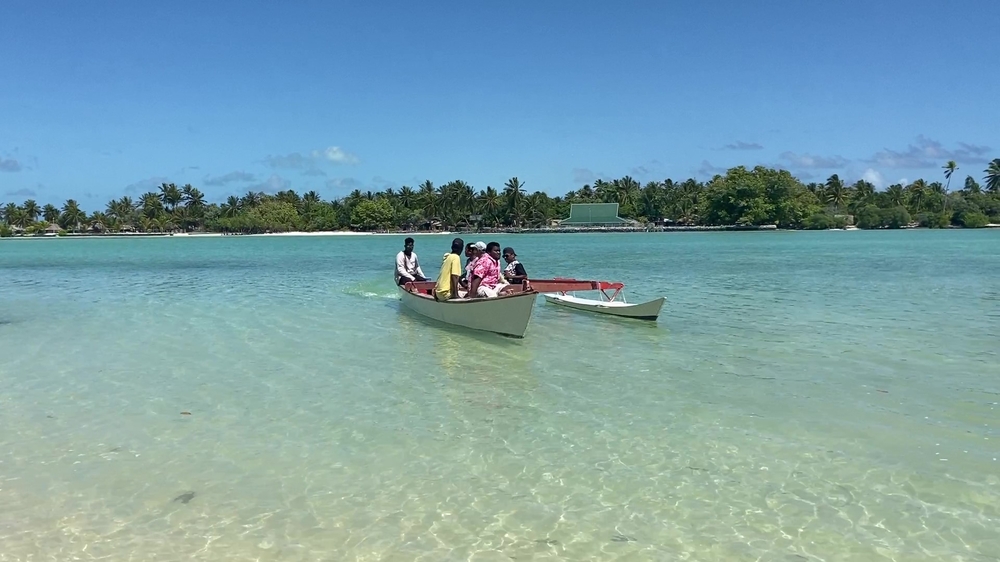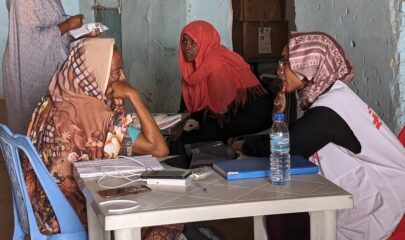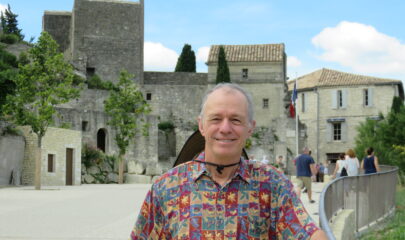Kiribati is a low-lying, Pacific atoll nation. The 32 atolls (and one raised coral island) lie between Australia and Hawaii and collectively cover 811 square kilometres of land in a vast ocean area of 3.5 million square kilometres.
The people of Kiribati (called i-Kiribati) are threatened by a changing climate.
The country’s small land mass is particularly vulnerable to a rising sea – the highest point on the main island of Tarawa is just three metres above sea level. Evidence of land shrinkage due to erosion is everywhere. In some places, uprooted trees lie where picnic spots and beaches once were. Homes are abandoned as the water comes closer and sandbags line the edges of the coast like chains of reinforcement. At full moon high tide, waves crash across the main causeway and flood homes.
Along with erosion, the salinization of underground water sources and soil, warmer air temperatures, more frequent king tides and drought are increasing.
In June 2022, the government declared a state of emergency because of a prolonged drought. Kiribati’s water table (which locals call the ‘water lens’) sits on top of the sea water and underneath the coral atoll island, making it prone to salinization. The water lens is replenished by rainfall but when the rain doesn’t come, people’s access to clean water is limited.
“The pattern of the drought has changed,” says Toakai Taburuea from the Kiribati Climate Action Network. “Before we had a drought once every 10 years. Now they are more frequent and last a long time. When people go to the wells, they are salty and growing food has become more difficult.”
THE CLIMATE CRISIS IS A HEALTH CRISIS
Human health is dependent on the health and sustainability of the environment. Nowhere is this more evident than for people living within the constraints of an island.
“It is very clear that climate change is a compounding factor that increases the burden of disease in Kiribati,” says Alison Jones, MSF medical coordinator in Kiribati. “This means we need to act now in trying to assist the country’s health ministry to reduce the burden of disease, which is likely to go up because of the climate crisis.”
MSF has been working in Kiribati since October 2022, in partnership with the Ministry of Health and Medical Services.
I-Kiribati have high rates of obesity but, conversely, the MSF team has been seeing more and more children who are malnourished.

“Here you see the collision of planetary health and non-communicable diseases that is unseen anywhere else,” says Dr. Lachlan McIver, MSF tropical diseases and planetary health advisor.
“What is striking compared to other countries I have worked in where there has been malnutrition is that many adults here are overweight,” says MSF pediatrician Dr. Jo Clarke. “That’s the other end of poor nutrition; large numbers of people with diet-related non-communicable diseases such as Type 2 diabetes. It’s difficult to grow fruit and vegetables here and accessing healthy, nutritious food is not easy. Most food is imported and it’s high in fat and sugar.”
An MSF team consisting of a pediatrician, midwife, pharmacist and pediatric nurse are working in the country’s main hospital to help build capacity among local health staff. An MSF team has also been visiting the Southern Gilbert Islands, supporting healthcare workers on neonatal care and screening women with high-risk pregnancies.
In the next few years, MSF teams plan to continue supporting sexual and reproductive health services as well as child health services in Kiribati’s largest hospital. Our teams will also help train health providers in the outer island’s medical facilities to improve primary healthcare and the management of non-communicable diseases.
Pacific islands are the canaries in the coal mine of climate change.
“Women and children are disproportionately affected by the climate crisis. We need to ramp up primary healthcare support on Kiribati’s most drought-affected islands to mitigate the impact of climate change,” says Jones, MSF medical coordinator.
An MSF water and sanitation expert will join the team to address the chronic lack of water facing health facilities in the Gilbert Islands, 30 per cent of which have no access to fresh water. Plans include rainwater harvesting and the provision of water tanks to the islands’ health centres and clinics.
Pacific islands are among the most climate-vulnerable places on earth: they are the ‘canaries in the coal mine of climate change.’ Kiribati is showing the rest of the world some of the most tangible impacts of climate change yet.



